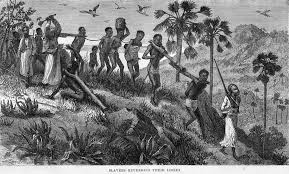slave
推荐文章

n. 奴隶;从动装置
vi. 苦干;拼命工作
n. (Slave)人名;(塞、罗)斯拉韦
n.
奴隶;完全受控制的人;从动装置;
v.
苦干;辛勤地工作;
变形
复数:slaves过去式:slaved过去分词:slaved现在分词:slaving第三人称单数:slaves
双语释义
n.(名词)[C] 奴隶,苦工 a person who is legally owned by sb else; servant without personal freedom who is treated as a piece of property
v.(动词)vi. 奴隶般地工作,做苦工 work like a slave; work hard with little rest
英英释义
slave[ sleiv ]
n.
a person who is owned by someone
someone who works as hard as a slave
同义词:striverhard worker
someone entirely dominated by some influence or person
"a slave to fashion"; "a slave to cocaine"; "his mother was his abject slave"
v.work very hard, like a slave
同义词:break one's backbuckle downknuckle down
adj.held in servitude
"he was born of slave parents"
词汇搭配
用作名词 (n.)
动词+~
buy a slave买奴隶
free slaves释放奴隶
liberate slaves解放奴隶
make a slave of that girl把那个女孩当奴隶
sell slaves卖奴隶
trade in slaves贩卖奴隶
形容词+~
runaway slave逃奴
white slave被迫〔被骗〕为娼者
willing slave乐于唯命是从的人
~+名词
slave labour奴隶的劳动
slave owners奴隶主
~+介词
slave of…的奴隶
slave of a habit习惯的奴隶
slave of fashion赶时髦的人
slave to…的奴隶
slave to a habit习惯的奴隶
slave to convention被习俗左右的人
slave to drink酒鬼
slave to duty被职务左右的人
slave to money视钱如命的人
用作动词 (v.)
~+介词
slave at被迫干某事
slave over被迫俯身于
双语例句
用作名词(n.)
This slave dreamed of becoming a freeman.
这个奴隶梦想着成为一个自由人。
The boy was caught and sold to be a galley slave.
这个男孩被抓住,并被卖到战舰上做奴隶。
He is a slave to drink.
他是个酒鬼。
用作动词(v.)
Why should I slave away all my life !
我为什么要辛辛苦苦地干一辈子呀!
We are born to slave it for our lord.
我们是生来为君王效犬马之劳的。
权威例句
Bilateral control of master-slave manipulators for ideal kinesthetic coupling-formulation and experimentBilateral control of master-slave manipulators for ideal kinesthetic coupling-formulation and experiment
Comparative analysis of master-slave latches and flip-flops for high-performance and low-power systems
The Slave Trade and the Origins of Mistrust in ...
Yoshikawa, T.: Bilateral control of master-slave manipulators for ideal kinesthetic coupling-formulation and experiment. IEEE Trans...
Repositioning and reorientation of master/slave relationship in minimally invasive telesurgery
Scheduling strategies for master-slave tasking on heterogeneous processor platforms
SLAVE: a genetic learning system based on an iterative approach
Alignment of master and slave in a minimally invasive surgical apparatus
Master-slave flip-flop with non-skewed complementary outputs, and methods to operate and manufacture the same
slave
slave: [13] The word slave commemorates the fate of the Slavic people in the past, reduced by conquest to a state of slavery. For ultimately slave and Slav are one and the same. The earliest record we have of the ethnic name is as Slavic Sloveninu, a word of unknown origin borrowed by Byzantine Greek as Sklábos and passed on to medieval Latin as Sclavus. It was this that was turned into a generic term sclavus ‘slave’, which passed into English via Old French esclave.
slave (n.)
late 13c., "person who is the chattel or property of another," from Old French esclave (13c.), from Medieval Latin Sclavus "slave" (source also of Italian schiavo, French esclave, Spanish esclavo), originally "Slav" (see Slav); so used in this secondary sense because of the many Slavs sold into slavery by conquering peoples.
This sense development arose in the consequence of the wars waged by Otto the Great and his successors against the Slavs, a great number of whom they took captive and sold into slavery. [Klein]
Meaning "one who has lost the power of resistance to some habit or vice" is from 1550s. Applied to devices from 1904, especially those which are controlled by others (compare slave jib in sailing, similarly of locomotives, flash bulbs, amplifiers). Slave-driver is attested from 1807; extended sense of "cruel or exacting task-master" is by 1854. Slate state in U.S. history is from 1812. Slave-trade is attested from 1734. Old English Wealh "Briton" also began to be used in the sense of "serf, slave" c.850; and Sanskrit dasa-, which can mean "slave," apparently is connected to dasyu- "pre-Aryan inhabitant of India." Grose's dictionary (1785) has under Negroe "A black-a-moor; figuratively used for a slave," without regard to race. More common Old English words for slave were þeow (related to þeowian "to serve") and þræl (see thrall). The Slavic words for "slave" (Russian rab, Serbo-Croatian rob, Old Church Slavonic rabu) are from Old Slavic *orbu, from the PIE root *orbh- (also source of orphan), the ground sense of which seems to be "thing that changes allegiance" (in the case of the slave, from himself to his master). The Slavic word is also the source of robot.slave (v.)
1550s, "to enslave," from slave (n.). The meaning "work like a slave" is first recorded 1719. Related: Slaved; slaving.
Slave
Indian tribe of northwestern Canada, 1789, from slave (n.), translating Cree (Algonquian) awahkan "captive, slave."
1. slave owner
奴隶主
-- 来源 -- 英汉 - 短句参考
2. slave quarters; slave trader; slave market.
奴隶的住处;贩奴商;奴隶市
-- 来源 -- 汉英 - 翻译参考
3. slave labor;a slave cylinder.
奴隶劳动;从属汽缸
-- 来源 -- 英汉 - 短句参考
4. slave transmitter
辅助发射机|中继发射机
-- 来源 -- 英汉 - 翻译参考[网络]
5. slave oscillator
从动振荡器
-- 来源 -- 英汉 - 翻译参考[网络]
6. slave controller
从属控制器|从动调节器
-- 来源 -- 英汉 - 翻译参考[网络]
7. installing two IDE devices on the same ribbon cable, one device must be set to "master"and the other, "slave
若同一排线上欲安装两台IDE装置,那么其中一台IDE装置必须设定为Slave。
-- 来源 -- 英汉 - 翻译样例 - 产品
8. slave operation
从动运行
-- 来源 -- 英汉 - 翻译参考[网络]
9. slave application
从属应用;备用机
-- 来源 -- 英汉 - 翻译参考[网络]
10. slave narrative
奴隶记事
-- 来源 -- 英汉 - 翻译参考[网络]
